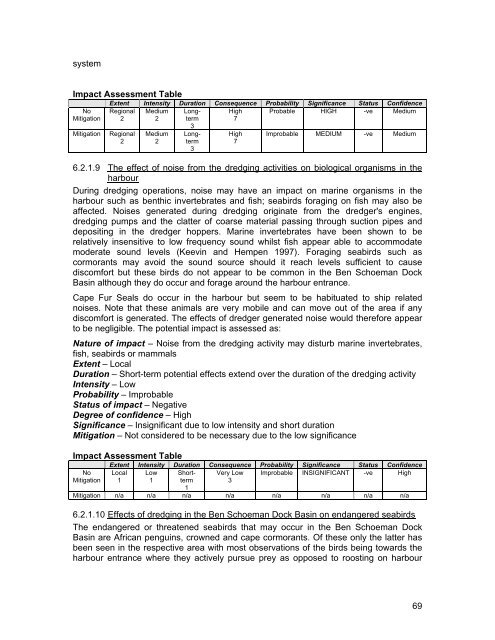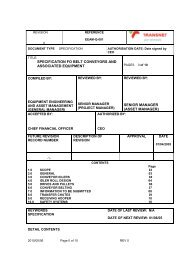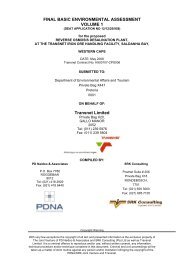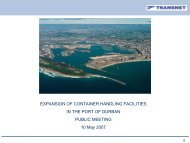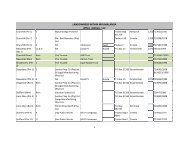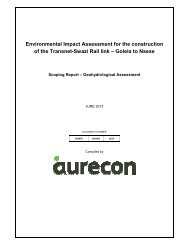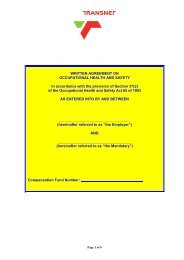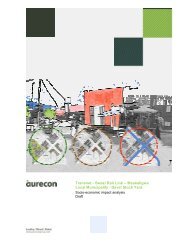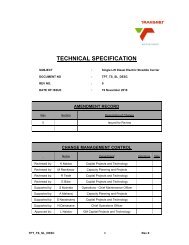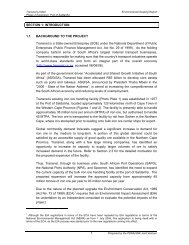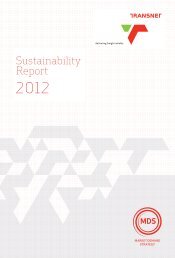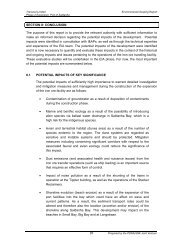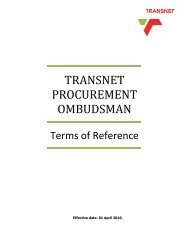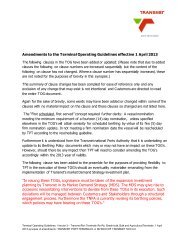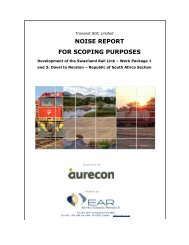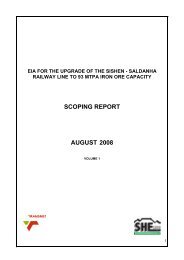BEN SCHOEMAN DOCK BERTH DEEPENING Specialist ... - Transnet
BEN SCHOEMAN DOCK BERTH DEEPENING Specialist ... - Transnet
BEN SCHOEMAN DOCK BERTH DEEPENING Specialist ... - Transnet
Create successful ePaper yourself
Turn your PDF publications into a flip-book with our unique Google optimized e-Paper software.
system<br />
Impact Assessment Table<br />
No<br />
Mitigation<br />
Mitigation<br />
Regional<br />
2<br />
Medium<br />
2<br />
Extent Intensity Duration Consequence Probability Significance Status Confidence<br />
Regional Medium Longterm<br />
High Probable HIGH -ve Medium<br />
2 2<br />
7<br />
3<br />
Longterm<br />
3<br />
High<br />
7<br />
Improbable MEDIUM -ve Medium<br />
6.2.1.9 The effect of noise from the dredging activities on biological organisms in the<br />
harbour<br />
During dredging operations, noise may have an impact on marine organisms in the<br />
harbour such as benthic invertebrates and fish; seabirds foraging on fish may also be<br />
affected. Noises generated during dredging originate from the dredger's engines,<br />
dredging pumps and the clatter of coarse material passing through suction pipes and<br />
depositing in the dredger hoppers. Marine invertebrates have been shown to be<br />
relatively insensitive to low frequency sound whilst fish appear able to accommodate<br />
moderate sound levels (Keevin and Hempen 1997). Foraging seabirds such as<br />
cormorants may avoid the sound source should it reach levels sufficient to cause<br />
discomfort but these birds do not appear to be common in the Ben Schoeman Dock<br />
Basin although they do occur and forage around the harbour entrance.<br />
Cape Fur Seals do occur in the harbour but seem to be habituated to ship related<br />
noises. Note that these animals are very mobile and can move out of the area if any<br />
discomfort is generated. The effects of dredger generated noise would therefore appear<br />
to be negligible. The potential impact is assessed as:<br />
Nature of impact – Noise from the dredging activity may disturb marine invertebrates,<br />
fish, seabirds or mammals<br />
Extent – Local<br />
Duration – Short-term potential effects extend over the duration of the dredging activity<br />
Intensity – Low<br />
Probability – Improbable<br />
Status of impact – Negative<br />
Degree of confidence – High<br />
Significance – Insignificant due to low intensity and short duration<br />
Mitigation – Not considered to be necessary due to the low significance<br />
Impact Assessment Table<br />
No<br />
Mitigation<br />
Extent Intensity Duration Consequence Probability Significance Status Confidence<br />
Local Low Shortterm<br />
Very Low Improbable INSIGNIFICANT -ve High<br />
1 1<br />
3<br />
1<br />
Mitigation n/a n/a n/a n/a n/a n/a n/a n/a<br />
6.2.1.10 Effects of dredging in the Ben Schoeman Dock Basin on endangered seabirds<br />
The endangered or threatened seabirds that may occur in the Ben Schoeman Dock<br />
Basin are African penguins, crowned and cape cormorants. Of these only the latter has<br />
been seen in the respective area with most observations of the birds being towards the<br />
harbour entrance where they actively pursue prey as opposed to roosting on harbour<br />
69


